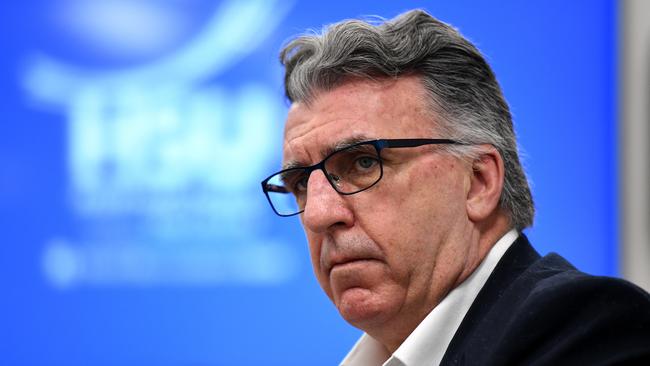Health union wants Medicare levy hike to fund aged-care reform
Scott Morrison and Anthony Albanese face grassroots marginal seat campaigns unless they adopt a bipartisan approach to fix the nation’s COVID-ravaged nursing home system.

Scott Morrison and Anthony Albanese face grassroots marginal seat campaigns unless they adopt a bipartisan approach to fix the nation’s COVID-ravaged nursing home system, including increasing the Medicare levy to fund almost 60,000 new aged-care jobs.
New modelling released by the Health Services Union and Equity Economics on Monday will call for the Medicare levy to rise from 2 per cent to 2.65 per cent, raising up to $20bn over four years.
HSU national president Gerard Hayes said action to repair the aged-care sector must not be shelved until after the Royal Commission into Aged Care Quality and Safety’s final report, which is due by February 26.
He also warned of a “robust and well-resourced marginal seat campaign” to force both major parties into delivering long-term aged-care funding blueprints, describing commitments at last year’s federal election as “underwhelming”.
Mr Albanese, who is considering various aged-care funding proposals for Labor to take to the election, on Sunday would not rule out an increase to the Medicare levy to inject funding into the aged-care sector.
Mr Hayes welcomed the Opposition Leader “opening the door” to the proposal but called for more immediate reform across the aged-care industry.
“We don’t need to wait for the royal commission to report. We are seeing both a jobs and aged-care crisis unfold in real time. Lives are being lost every week. Both sides of politics need to act with urgency,” Mr Hayes told The Australian.
Mr Albanese said Labor would examine the royal commission findings in relation to “structural change that’s required”.
“It’s very clear that the aged-care sector is, in the words of the royal commission, ‘subject to neglect at the moment’,” Mr Albanese told the ABC.
“And it’s also clear that with the ageing of the population, we need to have a strategy, a long-term view. At the moment, we’re not even able to fix the short term.”
The HSU and Equity Economics report, Delivering Decent Residential Aged Care: Funding the Care Elderly Australians Deserve,prepared ahead of next month’s royal commission hearings into financing aged care, reveals the extent of structural issues across the system.
It shows the aged-care sector is “not fit for purpose” and is gripped by inadequate funding, poor transparency and significant workforce challenges.
“International comparisons reveal that based on current staff ratios, only 42.5 per cent of aged-care homes would be considered satisfactory under the star rating system used in the United States,” the report says.
Increasing the Medicare levy by between 0.1 and 0.65 per cent would deliver $2bn to $20bn in additional funding and support up to 59,100 new jobs over the next four years.
The report projects a doubling of the aged-care workforce to 200,000 in the next two decades.
The HSU report calls for the establishment of a five-star system based on international standards providing nursing home residents with an extra 89 minutes of daily attention from carers, allied health therapists and registered nurses.
Mr Hayes said the union was pushing to lift wages above the minimum to attract and retain skilled workers across the sector, with personal care staff in aged care paid $22.87 per hour.
“Australians have a clear choice. We can provide dignity and decency to the generation that built this nation. And we can do it for a reasonably modest outlay,” he said.
“We knew our aged-care homes were running on the smell of an oily rag well before COVID. As the royal commission revealed, food budgets in aged-care facilities were as low as $6 a day per resident, while sanitary pads were being rationed.
“Carers rarely had time for basic activities such as taking residents to a local park, while functions such as catering and cleaning were outsourced, leading to horrendous wage theft.”
The number of people in residential aged care facilities is expected to grow to about 350,000 by 2040, up from 188,000 this year.
To match comparable OECD nations, Equity Economics estimates Australia would need to spend an additional 0.5 per cent of GDP annually, equivalent to $9.7bn, on long-term aged-care services. And an additional 100,000 workers will be needed over the next 20 years.








To join the conversation, please log in. Don't have an account? Register
Join the conversation, you are commenting as Logout